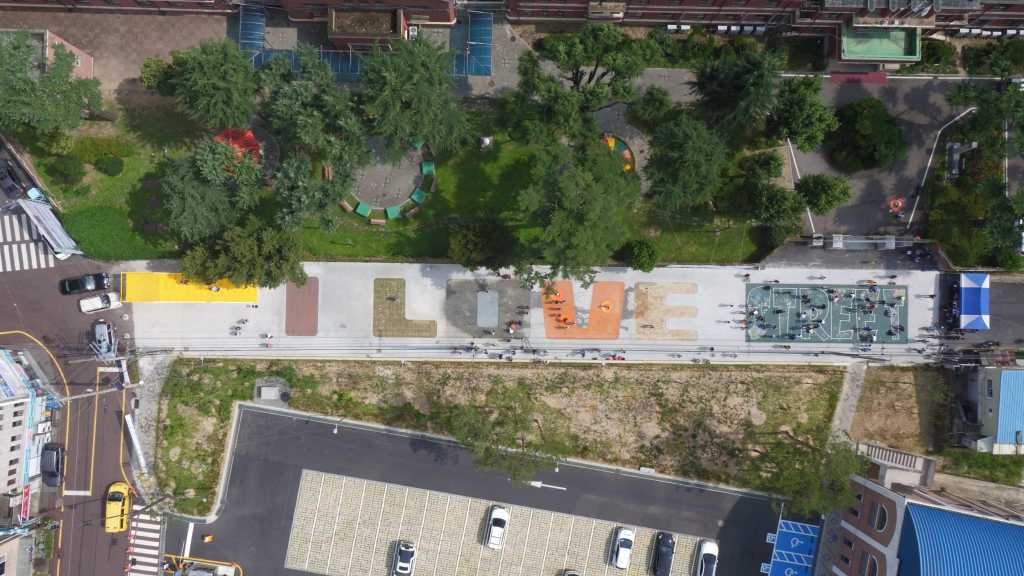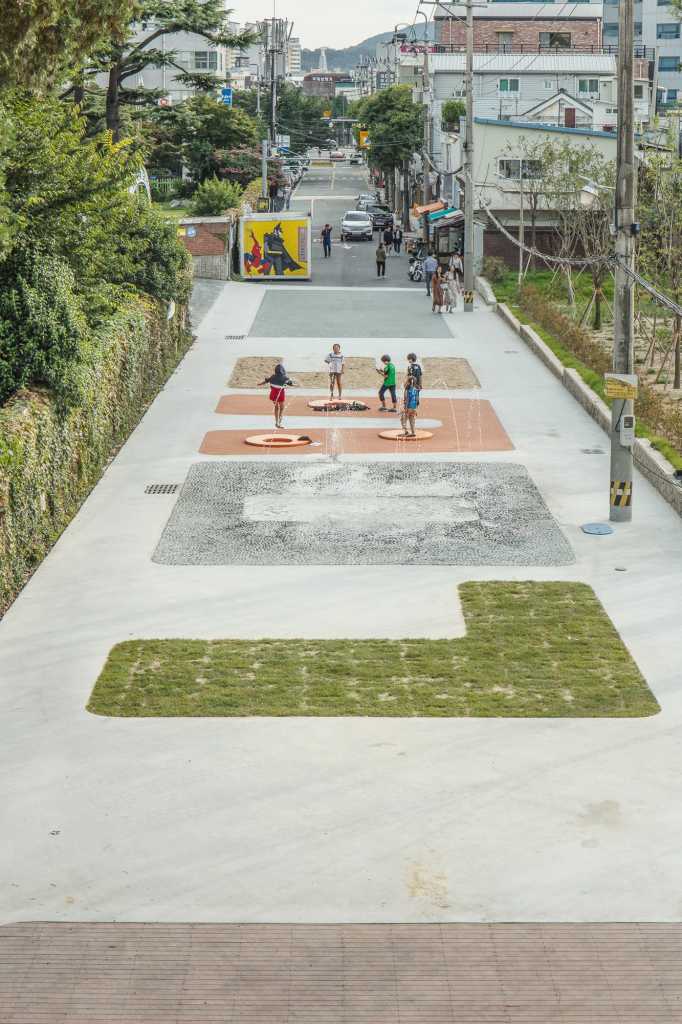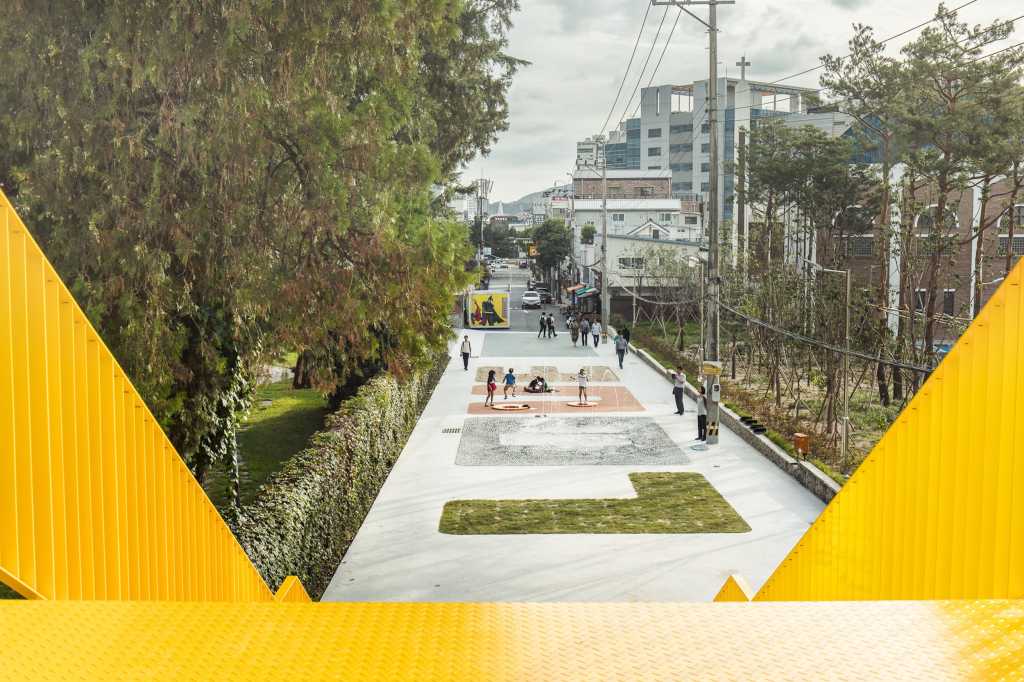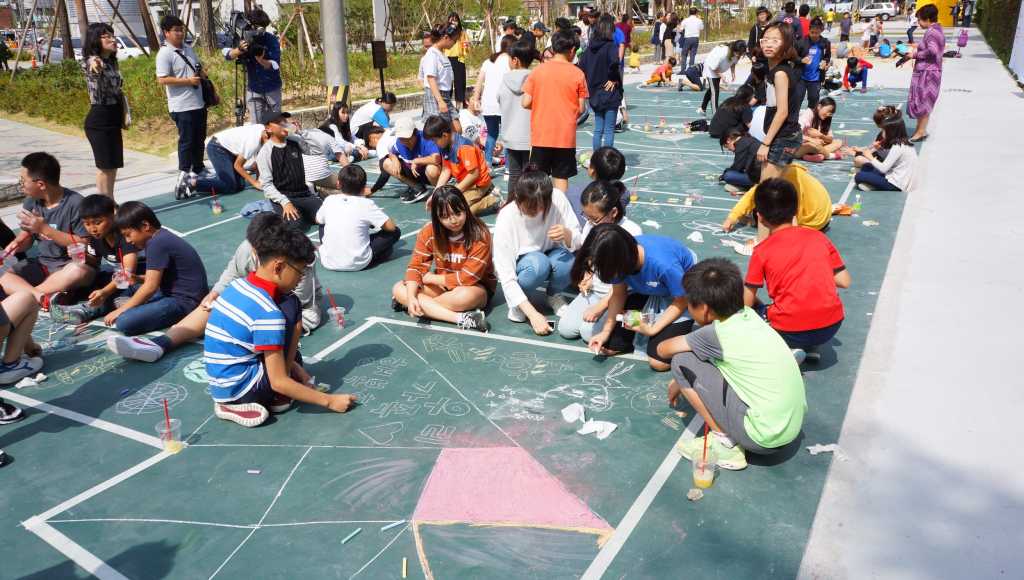MVRDV:“ 通过这条全新的街道,我们希望展示街道装置的意义和价值性,以具体的形式表现出更大的规划问题。它们作为实验以测试城市发展的未来方向,也将此理念传递给更广泛的受众。”
MVRDV:MVRDV realised I LOVE STREET in collaboration with students of the Seosuk Elementary School as one of the third edition of the Gwangju Folly. The 960m2 permanent intervention explores how architecture contributes to urban regeneration by playing both decorative and functional roles in public spaces. The project was conceived in a participatory process.


光州作为工业城市和韩国重要的汽车制造业重心,城市也曾被樱花树等自然风光所环绕,但近几年城市街道逐渐被机动车占领,步行区逐渐减少,甚至很多区域都缺乏人行步道。自2011年起光州市开始街道装置计划以推动城市更新,期望给经历了40年快速工业增长后的老城区注入新的文化生命。此次设计期望重新引导社会,来关注城市废弃用地的更新和利用,以及逐步将其转换为城市活跃及舒适的新场所。
Gwangju is known for its industrial qualities. A city with a booming car industry situated between beautiful surroundings of cherry blossoms and nature, but in recent years has become dominated by cars and lacks many pedestrianised zones, especially in its old part of town. From 2011, Gwangju, follies located all across Gwangju are designed to achieve urban regeneration by providing a cultural rebirth to its downtown area after 40 years of rapid industrial growth. These interventions are a step in refocusing attention on abandoned areas of the city with the potential to transform them into more livable and pleasant areas as they develop in time.


通过分析目前光州已有的街道装置,MVRDV进一步研究如何通过设计提升城市空间。MVRDV发现现存的街道装置缺乏与民众的参与互动,同时并没有提供足够的公共空间。因此,由MVRDV设计的I LOVE STREET 街道装置在当地社区居民积极地参与下开展,反对将街道再变为车行区。项目与Seosuk小学的学生合作,让学生们通过各种绘画表现他们对于街道改造的天马行空的想法:玻璃路面、喷泉、沙滩、木质街面、蹦蹦床亦或是一块巨大的黑板。MVRDV在学生的创作上加入一个阶梯,使步行区铺面更多样化,可用于绘画、静坐、跑跳、玩耍等各类活动。街面黑板将随着未来的使用者不断变化图案,同时阶梯作为一个小型活动看台,也是整条街道的自拍热点。
Concentrating on the old city of Gwangju, a series of research initiatives has been undertaken. By comparing Gwangju to other cities in Korea and around the world, its strengths and weaknesses have been evaluated. Gwangju, for instance, seems less walkable than other cities, and has insufficient public transportation. It is less bikeable, less attractive for tourists, has fewer green spaces, and is less cool in the summer than other cities. In addition, it is less energy independent and features fewer libraries, exhibitions, theatres, sports venues, playgrounds, and urban events than many cities.

通过L、O、V、E四个字母形状的不同铺面,寓意着当地居民对这个充满各种元素的新街区的喜爱,如同一个大型的室外画布,任何人都可在这里随时改变和再创作。它既是向城市致敬,也重新诠释了Donemyeong-ro路曾为城中聚落的悠久历史,而最终因城市化进程让步于机动车。某种意义上这个新的街道装置也是纪念过去的本土建筑,并且回归于适宜步行的无车区域。“ I LOVE Gwangju 街道装置可以有许多的变形 – I LOVE Korea, I LOVE Gwangju, I LOVE Walking 或 I LOVE Dancing,” MVRDV联合创始人Winy Maas说, “ 街道装置是一个小范围的设计干预,使城市更有社会性、更有趣、更富吸引力,而最重要的是它更直接地与当地居民交流,并鼓励在光州为行人创造更多空间。” Gwangju 街道装置庆典今年已经是第三届,已经产生了100个由知名艺术家、建筑师创造的街道装置,分布在城市的不同角落,这其中包括彼得·艾森曼、大卫·阿加叶、雷姆·库哈斯等。MVRDV此次光州街道装置的合作方为Gongjeong建筑公司。项目于2017年11月举行了开幕仪式。
Jebong-ro 82 (Seosuk Elementary School, 26, Jebong-ro 82 beon-gil, Dong-gu, Gwangju) will be closed for traffic. In collaboration with Seoseok Elementary School, a series of their requests has been explored. That has led to multiple different pavements that can be used for sitting, painting, jumping on trampolines, and playing in the sand. By shaping these pavements in a series of letters, a true text appears, indicating people’s love for many things through ‘I LOVE’. At the same time, a neutral square space at the end of the text is maintained for everyone’s personal use, and it can even be painted and adapted like a canvas. I LOVE can thus become I LOVE KOREA, I LOVE KIM, I LOVE WALKING, I LOVE THE MAYOR, I LOVE GWANGJU, or I LOVE YOU, for example.





地点: 韩国光州
年份: 2017年
客户: 光州双年展基金会
规模和方案: 960平方米 / 公共广场
设计: MVRDV – Winy Maas, Jacob van Rijs and Nathalie de Vries
设计团队: Winy Maas, Wenchian Shi, Kyosuk Lee with Dongmin Lee, Bowen Zhu and Sen Yang
合作伙伴
建筑: Gongjeong Construction co.
媒体艺术家: Jeroen Kooijmans
图片: 光州双年展基金会
Location: Gwangju, South Korea
Year: 2017
Client: Gwangju Biennial Foundation
Size and Programme: 960m2 public square
Design: MVRDV – Winy Maas, Jacob van Rijs and Nathalie de Vries
Design Team: Winy Maas, Wenchian Shi, Kyosuk Lee with Dongmin Lee, Bowen Zhu and Sen Yang
Partners
Construction: Gongjeong Construction co.
Media artist: Jeroen Kooijmans
Images: Gwangju Biennale Foundation
更多 Read more about: MVRDV




0 Comments